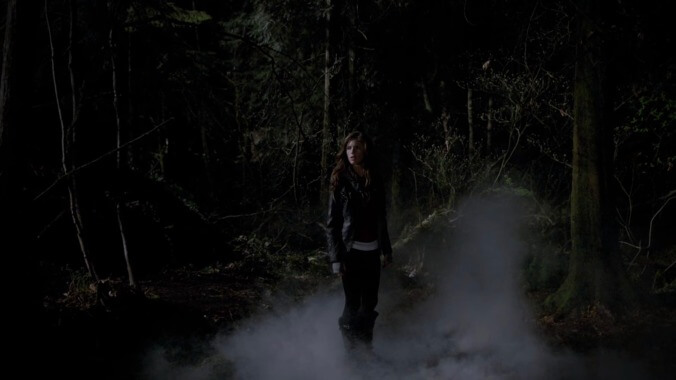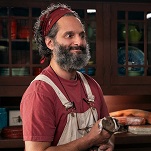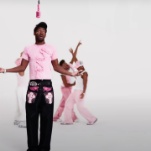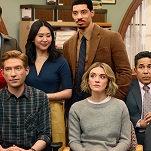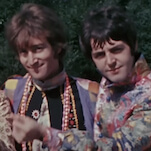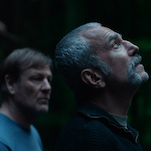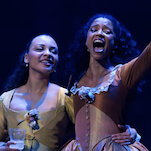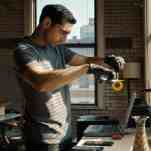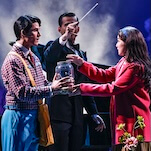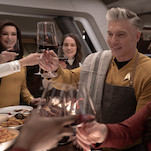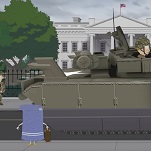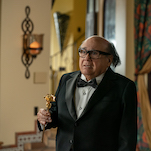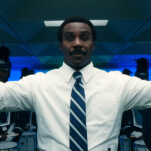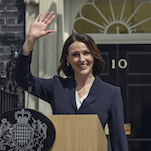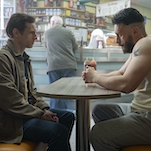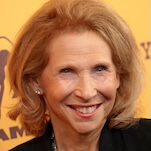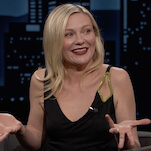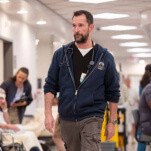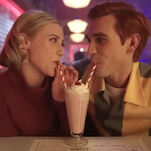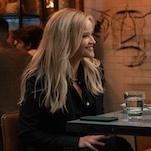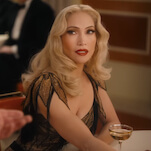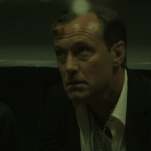After 13 years and 17 combined seasons of television, the Vampire Diaries Universe—that’s the namesake series and the two spinoffs it spawned, The Originals and Legacies—has come to an end on The CW, putting the kibosh on a franchise that has produced some very beloved supernatural characters. That is, at least for the time being.
In the end, Alaric decides to leave Mystic Falls but keeps the school going, giving the reins to Caroline Forbes (Candice King), the surrogate mother of his twin daughters, Lizzie (Jenny Boyd) and Josie (Kaylee Bryant). And after Landon (Aria Shahghasemi)—the new ferryman of Limbo—convinces him to find peace, Ethan is able to help Klaus deliver one last message to Hope, telling his “miracle child” that “the most important thing about your life is that you live it, because you are my peace.”
AVC: What were the logistics of Joseph’s shoot? I believe he was in Toronto shooting Titans and not on location in Atlanta, correct?
BM: Yes, he was. The “yes” was very quick, so once we sort of got it figured out, it’s just, “How are we gonna do this?” It just became about sending the director up to Toronto to shoot him on a green screen and sending the pages to Joe. In a perfect world, we would have put Hope and Klaus together, and they could have had a real scene. That was obviously the pie-in-the-sky scenario.
It quickly became obvious that COVID and the shooting schedule of Titans were not going to allow for that kind of thing without quarantines and blowing up their production schedule. Luckily, we’re a magical show and you’re willing to accept a lot in that moment, I think, to have that moment. [It was] logistically challenging, but emotionally and story-wise, certainly the right move and worth moving heaven and earth to happen.
AVC: What does Klaus’ final speech to Hope really reveal about their special connection as father and daughter?
BM: I think it’s a huge moment in a kid’s life when your parents tell you you’re gonna be okay, and I think that’s really what that moment is about. It’s about him telling her he’s proud of her, and it’s about him offering some advice. I think most people who lose a parent—and I’ve unfortunately gone through that experience myself—it’s really rough, and the thing you really wish you had is time or a last conversation, because you don’t know when that last conversation is ever going to exist. A lot of times you’re not aware it’s the last time that you’re going to talk to the most important people in your life, so it was nice to give Hope that moment. She truly had her father’s approval and love, and Klaus was always pretty direct about that, and he would show it in some pretty unconventional ways that were probably very confusing to a kid.
And I think on a Klaus level, it is him acknowledging the mistakes of his past and some of the horrible things he’s done; and I think letting go of those things is the thing that allows one to reach peace. We said early in the show that he could not reach peace until he knew Hope would be okay. Well, the story of Legacies is very much the story of, “What the hell is happening to Hope? And is she gonna be okay?” It’s always been in constant question, so it was nice to put a definitive button on at least this moment in her life and the end of our show.
AVC: How would you describe Hope’s evolution? She starts as the wary Mikaelson who is afraid to open up in the pilot and becomes the confident young woman who welcomes the next class of supernatural beings in the series finale.
BM: Dani’s been a really good partner in telling this story and [talking about] what we did want and did not want for the character. The school, as the show begins, is not a prison for Hope, but yet it is a constant set of eyeballs on her because they know there is this terrible destiny. And if she becomes the Tribrid, she’s going to become like her father. All those concerns are pretty valid, and yet there is this really beautiful side to Klaus that is very family-forward. So I think, generationally, it is about your kids not making the same mistakes you do and coming out the other side.
That was Hope’s story: All those things happened and all those things came true, and she experienced a profound amount of trauma—as so many young people just do nowadays. We’re just beginning to understand it better, and thank god for that. But it was really important to us to tell the story of the character who came out the other side and was better off for it, or made peace with it. You understood that she was building past it and defining life on her own terms. This place of the school being this monitoring system to this place at the end, [with] her not resenting her leadership role but fully embracing it and fully embracing her friends Lizzie and Josie.
AVC: Was there a reason why the show didn’t fully dive into the darker storylines that were set up for Hope in The Originals?
BM: On one level, it’s the Superman problem, because the minute you have the most powerful creature in the world, you have to find ways to put obstacles in that person’s way. And maybe there’d be some people who would like the show where Hope is just the most powerful creature in the world and just tears through every single thing in 20 minutes. [But] it’s just not generally [how] drama works, so you’ve always gotta find people who are stronger or at least a challenge—and it is a challenge.
The shows all have very different tones to them. I think The Vampire Diaries is a melodrama, and it’s a love triangle that later becomes a love story. The Originals was always about family. And Legacies has always been about friendship. It’s been about found family. And people like it for that; and people don’t like it for that and they go, “This is not as dark as we want.” Legacies came out of Parkland, came out of some of the worst things where you just looked at adults and said, “Boy, this is just such a systemic failure. How are these kids gonna get through it?” [But] you’re really looking to the younger generation and saying, “No, they’re gonna save us all and they’re gonna help us figure our stuff out. We’re gonna learn a lot from them.”
We know the other two chapters are a lot darker, a lot scarier, a lot more violent, and all those things, but we said, “The world is scary enough. The world is violent enough, and what is the antidote to that?” Legacies was always gonna be a lighter, more optimistic, more loving version of those problems than the previous chapters were, when maybe the world was a little less fucked. But there’s a lot of stuff you look at in the old shows, and you can never do those stories again, and it’s how the world changes and influences fiction and all those things. But I think that message is a consistent one throughout the show, whether people like it or not.
AVC: The finale gives a sense of closure to the tumultuous relationship between Hope and Landon. What is it about that dynamic that continued to intrigue you, and why did you want to keep exploring that after Landon died?
BM: Those two characters are just inextricably linked in this universe in a way, and they obviously end the show on kind of a non-romantic front, but that is also the way of young love. How many people had their first girlfriend, boyfriend and thought, “Wow, this is it” when you’re a kid? And the reality is, you don’t know how life is going to shake out, but their relationship evolved, and I would argue they are deeply meaningful to one another at the end. It’s just in a different and unexpected way, and that’s okay. That’s how life works for most people.
I think what really matters is that they are two characters who will always look out for each other’s interests and make great sacrifices for one other and just be there for one another. And at the end of the show, who’s to say where that story would go in the future? Obviously, we’ll never know, but it was interesting to evolve them to this place of deep respect and concern. That is the stuff of successful partnership, whether it is romantic or not.
AVC: In the finale, it is also finally revealed that Josie, who left earlier this season, cast a spell on a pendant that Hope had given her and sent it to the Mikaelsons to help Hope regain her humanity.
BM: Josie had to be instrumental to the end of this season and series in some way. That character, as brought to life by Kaylee Bryant, was too important to Legacies not to be.
AVC: The relationship between Jed (Ben Levin) and Ben (Zane Phillips) has become a pleasant surprise in the Vampire Diaries Universe. Why did you feel like now was the right time to depict a same-sex relationship between two male characters on Legacies and how did you work to avoid pervasive tropes about queer characters?
BM: I think it’s a story a lot of us have always wanted to tell. Ben Levin was super down to do it. Trying to find his leading man across from him was very difficult, and we just lucked out. Zane is such a star and just such a wonderful kid and [brought] full commitment. It was about getting the right story in place. And certainly you lean heavily on the queer writers in your room. No question, Price [Peterson] was instrumental.
We definitely entered this season with a real desire to put that relationship on screen in the Vampire Diaries Universe, and fans were gonna like it or not like it—and you ultimately have no control over that. But it’s certainly been really beautiful to see them be so embraced and be so loved. That was really one of the happier things for us this season, to just see that unfold and see the support it garnered. I don’t think you’d see a chapter in this franchise moving forward that didn’t really prioritize relationships like theirs, and that’s exciting, but it’s just two really good committed actors and a cool love story that touched people in the way you hope it touches people.
AVC: Why was Jed the only resurrected member of the Super Squad who lost his powers? Was the plan always for him to leave the school after this season?
BM: We were making the finale not knowing the fate of the show and trying to plant the seeds for stories we’d be excited to tell. Certainly, Jed and Ben were going to be a big part of the show moving forward and giving them a mystery to solve and a complication in their relationship seemed like a necessary driver of [the] story. But there’s also something really beautiful about Jed just being unencumbered by his past at a certain point and moving past that and really getting this clean slate with a person he really wants to write it with. The whole notion of curses and stuff—that’s just why Jed and Ben understand each other on a really fundamental level. Jed has such a crazy journey from being like a one-note bully in the pilot to being hugely complex. [He made] a choice, like, “I don’t want to be that person anymore.” Finding a person who really understands that journey and isn’t scared off by it was part of the reason that that story was beautiful to us.
AVC: What was the other ending that you shot in case you were picked up for another season? What would you have explored in a fifth season?
BM: We had [a cliffhanger] for kicking off the next season that included gods and a big time jump—and Jen (Piper Curda). The sadness of that is it’s Jen’s one scene in the finale. We love Jen, and we love what Piper did with that role. It certainly would have involved a fairly large time jump and characters in different places, and some god stuff that would create problems for Ben and Jed. But I think it would have been a season of having characters find their way back to one another and putting them on very different paths and taking them beyond the walls of the school.
So yes, we shot that one scene and it’s a Jed-Ben-Jen-Cronus scene, so that exists somewhere. We always knew if we get picked up beforehand, it goes in [the season-four finale], and if it doesn’t, we cut it out. It would have taken us into a really new and confusing and exciting chapter in all these characters’ lives.
AVC: In the finale, MG (Quincy Fouse) and Lizzie, and Cleo (Omani Okojie) and Kaleb (Chris Lee) seem to be ready to take the next step in their respective relationships. How would you say the events of this season—and, really, the episodes leading up to the finale—helped them realize what was truly important?
BM: I think they dealt with some pretty extreme circumstances, some of them actually dying and coming back to life. That’s a great crystallizer of things!
For MG and Lizzie, look, in a world where the show ends after four seasons, that feels like the logical conclusion of their story. MG has really had to step up into his own as a leader and what that means without compromising all the things that are core to that character. I think MG’s journey was to find out how to be a leader with heart, and I think Lizzie’s big fear has always been, like, “I will screw this good thing up.” It’s about her journey into feeling confident enough to just say, “I am good enough. I bring as much to the table as they do, and let’s stop putting obstacles in our way.” I think Aurora (Rebecca Breeds) and her journey with Hope this season are the things that really got her there.
Kaleb and Cleo face obstacles, but it was very important to us to see Cleo happy. I don’t think any of us would bet against them. Some of that is future-proofing for future stories, but I don’t think there’s any version where those characters don’t make it through the other side. I love how undeterred Kaleb is about fate and nonsense, because he knows this is the woman he loves and he’s gonna make it work. And for Cleo, who came out of such a tragic family story, to see a future where she has roots again…I think that was a good ending for her.
AVC: Cleo is seen taking a seat at the headmistress’ desk before she is interrupted by Caroline. Was that meant to foreshadow what could be in her future one day?
BM: Cleo’s glimpse of the future showed her that she would one day run the Salvatore School, and she was okay with that, and so it’s her trying it on for size in that moment. That’s absolutely what that’s all about.
AVC: What is the likelihood that we could have more spinoffs or a return to The Vampire Diaries in the future?
BM: It’s hard for me to imagine that the Vampire Diaries Universe is over for sure. I don’t know what form or fashion that will take. I know [Julie] and I talk about ideas, and there are many interesting things, but there are so many good characters. I think you could do shows based around so many members of our cast. I would watch the shit out of a Jed and Ben show.
AVC: There are people who have been asking for that!
BM: I know, and I am one of them. If Warner Bros is interested, I think we’re very interested, but I’d be excited to see more of Hope’s story—just all of them, honestly. I think we would drop in on any of them. And if Legacies ends, hopefully it goes off and lives this secondary life where kids find it on Netflix and find something in it that speaks to them.
But The Vampire Diaries is super rich, and there are many different types of shows and tonalities that have not been explored. Mystic Falls is a weird place, and Damon and Elena have a kid…. So as hard as it is to see Legacies end, I think it will continue.
Julie and I are always blown away by the number of kids who find the show on Netflix. There are so many daughters of friends who are experiencing it for the first time, so it makes us feel very old, and yet there is this beautiful, timeless nature to vampires. That’s why vampires fascinate us—they’re just such a metaphor for so many things and can twist into any genre. So I think there are many, many more stories to be told in that franchise. If anybody wants them, then they certainly know where to find us.
